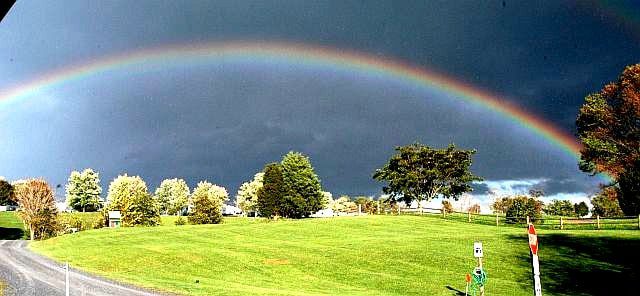
The Country Waye Campground
Stories from the Spiritual Traveler

Some Local History of Page County
| The Gettysburg RetreatDuring his retreat after the defeat at Gettysburg (July 1-3), Confederate General Robert E. Lee led his Army of Northern Virginia into the Shenandoah Valley. During the last week of July 1863, Lee encamped on the section of Pass Run just 2 miles east of here while waiting for his rear guard to arrive. He then ordered Jubal Early's corps to move south along the Valley Pike (modern day US 11) while Lee took the main body of his army north to Front Royal on what is now US340. At Front Royal, Lee detached a division to engage Meade's Union Army in Manassas Gap (where I66 now crosses the Blue Ridge) in a delaying action which was the last engagement of the Gettysburg Campaign. This successful delaying action, allowed Lee to move the main body of his army into the Luray area in safety. When Early's corps crossed the New Market Gap into the Luray Valley (now the route of US211), his rear guard disengaged at Manassas Gap and rejoined the main body of Lee's army. Lee led the reunited Army of Northern Virginia across the Blue Ridge, through the mountain gaps in Page County, and returned to the Virginia Piedmont, thus ending the Gettysburg Campaign. During Lee's stay here, and during other Civil War actions in this area, the old church on Kimble Road just east of here was used as a hospital. Custer's Last Charge in Page CountyOn November 24. 1861, Merrit's Union cavalry, acting on orders from General Philip Sheridan, moved south from Front Royal into the Luray Valley with the goal of clearing the Confederate forces from Page County. The Union troopers encountered the first Confederate pickets at Rileyville, and a running fight ensued which ended near here at the Confederate positions along Pass Run. Union Brigatier General George Armstrong Custer led his brigade in one of his trademark charges, which broke the Confederate line and began a “race” between blue and gray horsemen from Pass Run, through Luray and into the New Market Gap. This was the last Civil War engagement in Page County. A Page County HeroineNear this spot in 1814. a remarkable African American named Bethany Veney was born a slave. Bethany spent a lifetime working her way toward freedom. She convinced her Page County masters to allow her to perform extra work for pay, and to keep a portion of her wages. She worked as a domestic servant and as a cook for road construction crews. saving for the day when she would be free. Finally, hired to cook for northern copper speculators, Bethany convinced them to buy her and her infant son into freedom for $600. The men took her and her son Joe, north in 1858, where she worked as a domestic servant to repay her freedom price. Bethany was married twice. Her first husband, Jerry, also a slave. was sold south. Her second husband, Frank Veney, was a free man, but as a slave, Bethany wasn't allowed to live with him. Their baby son died free in Massachusetts. soon after he and his mother arrived. After the Civil War. Bethany returned to Page County and took her daughter, from her first marriage, and her daughter's family back to Worchester Massachusetts, to live in one of the two houses she now owned. A devout Methodist, Bethany also performed many kind acts for her former masters in Page County, who had fallen on hard times after the war. |
